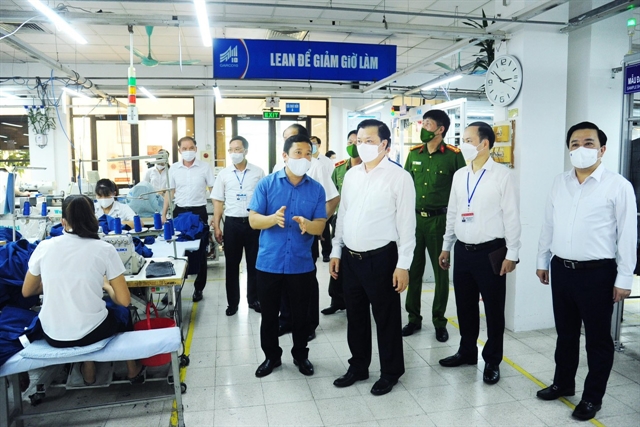The capital city’s businesses and production facilities have developed plans to reopen as Ha Noi reports fewer positive cases of COVID-19.

The capital city’s businesses and production facilities have developed plans to reopen as Ha Noi reports fewer positive cases of COVID-19.
Four months before the end 2021, a number of business establishments, services and enterprises have started to reopen, while workers were gradually returning.
Thai Minh Hi-tech Joint Stock Company in Thach That Industrial Park, Quoc Oai District, said staffing levels had reached up to 90 per cent instead of about 40 per cent when the firm implemented the "3-on-site" model.
The "3-on-site" model means having staff stay, eat and work at the factory.
Director of the firm Do Viet Ha told local media that the division of risk zones has helped to solve labour difficulties for enterprises as workers from green zones could work.
General Director of Garment 10 Corporation Than Duc Viet said that over the past 40 days when Ha Noi implemented Directive 16 of the Government, it led to disruptions in the global supply chain, especially in the export sector. Viet added until September 6, Ha Noi officially applied Directives 15, 15+ and 16+, however, he said the the zoning will help businesses in safe and low-risk areas still maintain safe production.
“Along with pandemic prevention measures, May 10 has implemented regular and continuous dissemination of plans to each employee, thereby spreading the anti-pandemic spirit of each individual to the community, family and the people around them," said Viet.
He said living with the pandemic and stabilising production, Garment 10 still applies pandemic prevention and control measures. The firm has worked to vaccinate all employees in seven provinces and cities where May 10 has factories.
Chairman of garment producer M2 Vietnam Joint Stock Company Nguyen Hai Duong said that the impact of the pandemic has caused difficulties for the textile industry, adding the M2F textile factory has developed a scenario to respond to the pandemic flexibly and effectively.
For example, the firm's dining tables in the canteen are limited to a maximum of four people, and there are always posters on the table to remind employees of regulations.
In addition, the M2 leader prepared development plans, together building a "new normal", ready to catch up with production right after social distancing.
Duong said M2 no longer made quarterly, monthly, or even yearly plans, as the circumstances change day by day, hour by hour.
In addition, M2 also tried to find orders so that employees can produce key products with high efficiency, seek ways to strengthen links in production, from spinning, weaving, to dyeing, so firms in the chain can stabilise and develop together.
Producing fresh and dried noodles, director Nguyen Thi Phuong, from Pho Ha Thanh Firm, said after social distancing, the demand for food and agricultural products will stabilise, estimating the demand to be greater than usual.
Therefore, methods to restore production should to be taken into account to balance increasing demand and low supply capacity due to the shortages of raw materials.
Phuong said human resources must be recruited and re-trained because many workers returned to their hometown.
During an online meeting on September 12, deputy chairman of Ha Noi People's Committee Nguyen Manh Quyen said that after September 21, Ha Noi will not implement zoning.
It was expected that the last types of services that have been suspended will be allowed to reopen.
Accordingly, localities must calculate, research, and soon have an orientation for the anti-pandemic period after September 21.
For regions 2 and 3, local authorities must create conditions for people to develop production and construction under strict disease control conditions.
Along with that, districts and sectors must actively develop plans to restore the economy and services, so that when the city has a decision to relax social distancing, they should immediately start implementing it, while ensuring socio-economic development alongside disease prevention and control.
Acting director of the city's Department of Industry and Trade Tran Thi Phuong Lan said the department will coordinate with the Department of Planning and Investment, the Department of Agriculture and Rural Development, the Management Board of Industrial Parks and Export Processing, and relevant agencies to develop a plan to recover and promote the economy closely following the progress of disease control in each area of the city.
Specifically, they will let low-risk areas maintain production and business activities and gradually restore and boost production in areas where social distancing ends, ensure safety and strictly comply with regulations on pandemic prevention and control.
In high-risk areas, the city will continue to strictly implement social distancing, said Lan, adding they will coordinate with the Department of Transport to ensure smooth transportation and circulation of goods. — VNS





